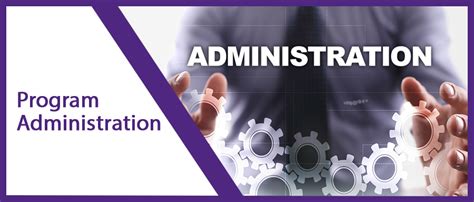Program administrators play a pivotal role in shaping the success of their organizations by managing and supporting multiple programs within their domain. Their responsibilities encompass a wide range of tasks, granting them a unique vantage point and crucial influence over the overall functionality and performance of these programs. This comprehensive guide will delve into the various actions program administrators can undertake to maximize their impact and drive positive outcomes.

Authorization and Approval
-
Authorize User Access: Program administrators possess the authority to grant or deny user access to specific programs and their respective features, ensuring compliance with security protocols and maintaining data integrity.
-
Approve Program Changes: Major program modifications, such as enhancements or updates, require the approval of program administrators. They evaluate proposed changes, assess their impact, and determine whether to proceed with implementation.
Program Management
-
Set Program Objectives and Goals: Program administrators collaborate with stakeholders to establish clear and measurable program objectives and goals, which serve as guiding principles for program execution and evaluation.
-
Develop and Implement Program Plans: They lead the development of comprehensive program plans that outline the strategies, timelines, and resources necessary to achieve program goals. These plans are instrumental in coordinating program activities and ensuring alignment with organizational objectives.
-
Monitor and Evaluate Program Progress: Program administrators monitor program progress regularly to track performance against objectives. They analyze data, identify areas for improvement, and make necessary adjustments to enhance program effectiveness.
Resource Allocation
-
Control Program Budgets: Program administrators are responsible for allocating and managing program budgets, ensuring that financial resources are utilized efficiently and in accordance with established priorities. This involves budget planning, tracking expenses, and identifying areas for cost optimization.
-
Acquire and Manage Resources: They procure and manage necessary resources for programs, including human resources, equipment, and materials. This involves recruiting and onboarding staff, negotiating vendor contracts, and ensuring the availability of essential supplies.
Communication and Collaboration
-
Communicate with Stakeholders: Program administrators serve as the primary point of contact for stakeholders, including program participants, staff, and external partners. They disseminate information, respond to inquiries, and foster collaboration to ensure effective communication and engagement.
-
Collaborate with Other Departments: Programs often depend on the support of other departments within the organization. Program administrators collaborate closely with these departments to coordinate activities, share resources, and ensure seamless integration across functional areas.
Data Management and Analysis
-
Collect and Analyze Program Data: Program administrators collect and analyze data related to program performance, participant demographics, and resource utilization. This data provides valuable insights into program effectiveness and informs future planning and decision-making.
-
Maintain Data Privacy and Security: They ensure compliance with data protection laws and regulations by implementing robust security measures to safeguard sensitive data collected through programs. This includes data encryption, access controls, and regular security audits.
Training and Development
-
Provide Training and Support for Program Staff: Program administrators provide training and support to program staff to enhance their skills and knowledge. This includes training on program policies, procedures, and best practices.
-
Develop and Implement Staff Training Programs: They develop and implement tailored training programs to ensure that staff members are equipped with the necessary skills and competencies to effectively deliver programs and achieve desired outcomes.
Advocacy and Outreach
-
Advocate for Program Funding: Program administrators advocate for continued funding and resources to support existing programs and develop new ones. They present compelling business cases and demonstrate program impact to secure financial support.
-
Conduct Outreach Activities: They conduct outreach activities to promote programs and engage potential participants. This includes attending community events, distributing promotional materials, and collaborating with community organizations.
Case Studies in Program Administration Success
Case Study 1: The National Cancer Institute (NCI)
The NCI is a leading organization in cancer research and patient care. Its program administrators played a crucial role in the success of the Cancer Moonshot Initiative, a multi-billion dollar effort to accelerate cancer research and improve patient outcomes.
Program administrators at NCI:
- Authorized access to research data for scientists around the world
- Approved funding for innovative research projects
- Monitored and evaluated progress towards initiative goals
- Collaborated with patient advocacy groups to ensure patient input
- Advocated for increased funding to sustain the initiative
Case Study 2: The World Food Programme (WFP)
The WFP is the leading humanitarian organization fighting hunger worldwide. Program administrators at WFP:
- Managed a budget of over $8 billion, ensuring that funds were allocated effectively to reach those in need
- Coordinated logistics for transporting food supplies to conflict zones and disaster-affected areas
- Analyzed data on beneficiaries to identify areas for targeted interventions
- Advocated for policy changes to address the root causes of hunger
Future Trends in Program Administration
- Increased use of technology: Program administrators are leveraging technology to streamline administrative tasks, improve data collection, and enhance program delivery.
- Growing importance of data analytics: Data analytics is becoming increasingly important in program administration, providing insights to drive decision-making and improve program outcomes.
- Focus on program innovation: Program administrators are embracing innovation to develop new and more effective ways to deliver programs and achieve desired outcomes.
Conclusion
Program administrators are the unsung heroes behind successful programs. Their diverse responsibilities, from authorization and approval to data management and advocacy, allow them to shape the delivery and impact of these programs. By embracing emerging trends and leveraging their expertise, program administrators can continue to drive positive outcomes and make a significant contribution to the success of their organizations.
